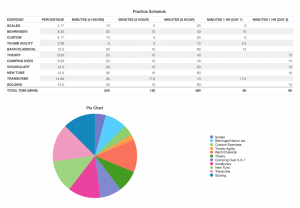Practising The Piano
10 Essential Tips For Effective Piano Practice
Sidney Harrison, author of The Young Person’s Guide To Playing The Piano, once asked an infant prodigy “how much do you practise?” The answer came back, “as much as I need”. An admirable sentiment, but while piano professionals can spend as long as it takes practising the piano, some of us don’t have six or eight hours a day to spend, so how can we make the most out of the limited time we have?
1. Schedule Your Piano Practice
It may sound a bit obvious, but whenever possible it’s important to schedule regular slots for practising the piano. Randomly fitting piano practice sessions around your other daily activities won’t work long-term, especially for people with busy schedules. Having a regular time that you know is dedicated to piano practice will help you focus on the work in hand and you should also ask your family, flatmates etc not to make demands on you at this special time. Many people find the morning to be the best time, as the mind and body are fresh, but if this isn’t possible, I recommend choosing a time when you’re not absolutely exhausted from a long day, or when the brain & fingers aren’t being slowed down on the piano keys by after-work drinks!
2. Planning Piano Practice Sessions
Many piano players like to write a plan for their practice sessions. It certainly helps to identify goals and have a series of practice routines to help you reach them. If writing lists helps to do this better for you, then it has to be a good idea, right? You could even tick off each task as it’s completed, increasing your feeling of satisfaction as you work through the list. Here's an example of a schedule that I've adapted for my own jazz piano practice sessions. If you're an Apple user, you can download a Numbers file here which you can edit and adapt to your own schedule. If you'd like a Word Doc version please contact me & I'll happily send one over to you.

3. Mental Preparation
Even 10 minutes of fully concentrated practising on the piano is better than hours of fiddling about aimlessly on the keyboard. Again the key word here is ‘focus’. Once you’ve planned your goals for this practice session, switch off the phone, TV, radio etc, maybe close the door or make sure that the space you’re in is otherwise clear of distractions, then give full attention to practising the piano. Avoid ‘mechanical practising’ – repetition of the same material in exactly the same way without paying full attention. Be mindful of your practice efforts, changing things that don’t work, honing and improving the things that do, keeping a firm focus on your goals for that practice session.
4. Warming Up and other Physical Aspects of Piano Practice
There is some thought that using yoga or sports related stretching exercises prior to practicing the piano is beneficial. I’ve even read that dipping the forearms in warm water will help to literally ‘warm up’ the arms. Others use the term simply to mean finger exercises such as scales, arpeggios and exercises (eg Czerny, Hanon or Beringer) leading up to the main practice session. My own take is that it’s no bad thing to prepare your body for intensive muscular work, paying further attention to maintaining good posture, relaxation of the shoulders, good breathing, correct arm and hand placement etc. Although I have no affiliation to the author of it, I’ve found this video containing exercises for piano players very informative. I personally also recommend performing some specialised light strengthening exercises, such as wrist curls etc with 1kg and 2kg weights.
5. One At A Time Please!
Now we’re down to the nitty gritty and actually practising the piano, it’s good to approach the task methodically. Flitting indecisively from your Keith Jarrett transcription to your Chopin will only end up in neither piece receiving the attention it deserves. Much better to decide on a short passage from one of the pieces for that day and work on that portion slowly until it’s completed. Being a glutton for punishment, I usually start first with the parts I'm having the most difficulty with, so I can enjoy working on the 'easier' stuff later. If your practice schedule includes some scales, Hanon exercises, Chopin AND the Jarrett, then plan long enough to get them all done properly! 🙂
On the subject of pieces - I don't believe in working on too many pieces at once. Some suggest 5 pieces on the go, but my own personal belief is that more than 3 pieces will dilute the quality of the work being done. Practise these pieces until they're ready for public performance before moving onto a new piece.
6. Accuracy Over Speed
Yes of COURSE you want to learn the piece as quickly as possible, but even if you can KIND OF play it all the way through with just a couple of stops (to get the fingering right, or to tackle that tricky passage), it’s going to save you time in the long run to just concentrate on a short section and really nail it. Why not start with the most difficult sections first? Run each one slowly and deliberately and don’t move on until you’ve got it. Sometimes I choose just a bar, or even a fraction of a bar to work on (sometimes even one note), so don’t feel that it’s embarrassing or wrong in some way to work in small sections. Once you've nailed the section that was giving you trouble, slightly overlap the beginning & ends of the section with the sections directly before and after, so you can practise joining them up with the rest of the piece.
7. Working With Mistakes
While I allow the freedom to make 'mistakes' during improvisation practice (Miles Davis famously said that in jazz there ARE no mistakes), in the context of preparing a pre-written piece for performance, it’s never ok to just ‘let things slide’ when you’re deep into practising the piano. By practising mistakes into your piece, you’re setting up a long hard task for yourself later on when they need to be corrected. They also create uncertainty, which it is your job to get rid of as part of your practice routine. Remember, by playing slowly and accurately and focusing hard on the passage, you’ll build a strong foundation that will be hard to shake, even when you’re nervous during a live performance.
8. Keeping A Record – The Practice Diary and Audio Recording
Recording your sessions is always a good idea. I use a dictation app on my iPhone, which I can then load into iTunes at the end of my practice to listen to myself. By doing this you can monitor your progress and be more aware of the work that still needs doing. Some people keep a diary with strict times allocated for each part of the practice session, the idea being that sticking to this schedule can help you to focus harder on each section.
9. Mental Practice
I’ve lost count of the number of times I mentally run a difficult music passage I’m wrestling with while sitting on the bus, or going about one of the mundane chores of the day. When I’ve come back to that passage next day, it’s as if there had been a whole other practice session that I didn’t know about – everything seems to come much more easily to me and very often this process has completely solved the problem! It’s totally possible to practise even when you’re not in front of the piano. Once you’ve worked out your solutions to difficult passages at the piano, you can run the process through in your mind wherever you are.
10. Finish The Piece!
One of my best friends surprised me one day. I'd been playing a section of an Oscar Peterson piece for years to warm up, but on one occasion I played the entire piece. He turned and said "Oh, you've finally finished it. That's great, it's the first time I've heard you play it from beginning to end"! This highlighted to me how important it is to be able to give a full performance - whether to friends in private, at local recitals or in the concert hall.
More than once my students have arrived at lessons saying "I've really got this one nailed now" or words to that effect, only to play through the piece with multiple stops, dramatic tempo changes to facilitate tricky passages or other interruptions. A piece is not finished until you can play it flawlessly from beginning to end without stopping. Of course, there's much more to it than that - dynamics, expression, stylistic considerations amongst others, but you get the idea.
So ok, not everyone is planning a major public performance, but I do recommend at the very least that you play to your family and friends. Treat it as a recital, with everyone listening and paying full attention, not with you playing 'background music'. The very act of playing to an attentive audience raises the level for the performer and also highlights what aspects may need further attention in their practice routine. I recommend you do this as often as possible. If you're studying for exams, then all the above is a given anyway, as the exam will be your 'performance'.
Gyorgy Sandor in his excellent book ‘On Piano Playing’ likens a piano performance to the tip of an iceberg, with the practice leading up to it as the “immense and invisible bulk” of the iceberg underneath the surface. There’s nothing quite so satisfying (well, not much anyway) as finishing a piece and performing it to an enthusiastic audience. Practising is a real craft, minimising effort and maximising efficiency to get the best results. Hopefully you’ve picked up some useful tips from this article, HAPPY PRACTISING!
Practising The Piano in Notting Hill | Practising The Piano in Knightsbridge | Practising The Piano in Kensington | Practising The Piano in Holland Park | Practising The Piano in Shepherds Bush | Practising The Piano in Maida Vale | Practising The Piano in Paddington | Practising The Piano in Royal Oak | Practising The Piano in Kensal Green | Practising The Piano in Kensal Rise | Practising The Piano in Harlesden | Practising The Piano in Willesden | Practising The Piano in Acton | Practising The Piano in Bayswater | Practising The Piano in Lancaster Gate | Practising The Piano in White City | Practising The Piano in North Kensington | Practising The Piano in Kilburn
